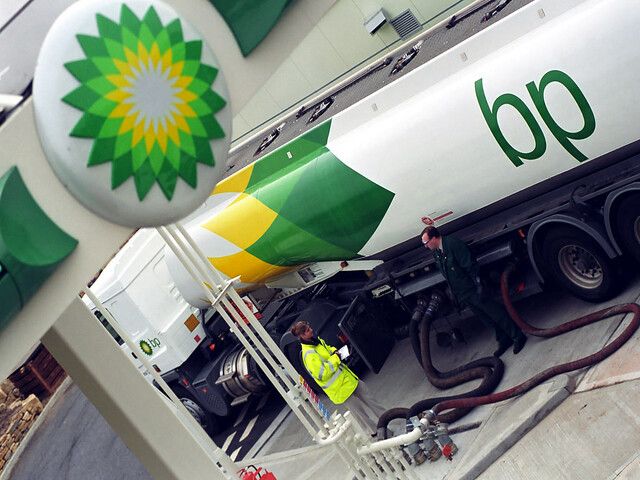Oil giants have been accused of investing too little in the carbon transition and benefiting off the backs of the poor after Shell and BP’s have reported bumper profits.
ESG investors have called on the companies to use their huge profits to do more to help those in the UK who are at risk of having their gas and electricity supplies cut off, and put more money into renewable projects.
BP lowers emissions cut
On Tuesday BP reported its profits more than doubled to $27.7bn in 2022, as energy prices soared after Russia invaded Ukraine. The firm also revealed it had scaled back plans to reduce the amount of oil and gas it produces by 2030.
The company also changed its ‘Aim 2’ to reduce the Scope 3 product emissions from its own oil and gas production to 20-30% by 2030, down from 35-40%.
Furthermore, BP announced plans to increase investments in oil and gas by around $1bn per year.
“If the bulk of your investments remain tied to fossil fuels, and you even plan to increase those investments, you cannot maintain to be Paris-aligned, because you will not achieve large-scale emissions reductions by 2030,” said Mark van Baal, founder of Follow This, activist shareholder in Big Oil, in a statement. “Apparently, BP sees the windfall profits in oil and gas not as an opportunity to massively increase investments in renewables, but as an encouragement to increase investments in fossil fuels.”
Shell biggest profits on record
Meanwhile, on Feb. 2 Shell reported its highest profits in 115 years, after the energy price surge last year. Profits hit $39.9bn in 2022 – double last year’s total.
Shareholders will benefit from a 15% hike in dividend payments, and a bumper $4bn share buyback scheme is also planned.
Shell has also faced criticism for failing to invest enough in transition to renewable energy; its investments (cash Capex) into renewables and energy solutions (RES) were $3.5bn out of a total of $24.8bn, just 14%, the company’s fourth quarter results show.
Since RES also includes gas and carbon offsets, the actual investments in renewables are thought to be lower. According to Global Witness it was just 1.5% in 2021.
Poorest energy users suffer
Shell and BP’s record profits come at a time when UK households are struggling with the cost of energy, especially the country’s poorest.
An investigation by The Times newspaper found as people are unable to pay soaring energy bills, British Gas is forcing them onto prepay meters that are even more expensive and easier to cut off supply.
Dan Sherrard-Smith at Mothertree, a service to find out the climate impact of your bank, said Shell and BP’s record profits are “a slap in the face for the UK public and the planet”.
“Shell, and other fossil fuel companies, continue to plunge money into fossil fuel projects, at a time when consumers are desperate for relief on their energy bills and increasingly supportive of local renewable energy projects,” he said.
Julia Dreblow, founder of SRI Services and member of the ESG Clarity Committee, said seeing big oil companies making enormous profits “rubs salt harshly into the wound” when there are people in the UK in 2023 who are choosing between heating and eating.
She pointed out only a fraction of Shell’s profits are made in the UK and it does not set UK energy prices.
“We know climate change does, and will, continue to hit the poorest in society the hardest, and we must act swiftly to stop things getting much, much worse,” she said.
Windfall tax
Prime Minister Rishi Sunak introduced a windfall tax on oil and gas companies when he was chancellor, describing it as a 25% Energy Profits Levy. This increased to 35% from January 2023, and will stay in place until March 2028.
“The bulk of Shell’s investments remain tied to fossil fuel businesses, because the company doesn’t have a target to slash its total CO2 emissions this decade, as is required to reach Paris,” Van Baal said. “Shell can’t claim to be in transition as long as investments in fossil fuels dwarf investments in renewables.”
Shell’s current target to reduce the average carbon content (net carbon footprint) of its energy products by 20% by 2030 is not yet Paris-aligned, so market watchers are skeptical it will lead to large-scale net reductions in total emissions in this crucial decade.
‘Outrageous profits’
Duncan Grierson, CEO and founder of Clim8 Invest, called the oil and gas majors’ massive profits “outrageous” on the back of surging energy prices created by Russia’s invasion of Ukraine.
“Yet these profits have neither been used to soften the blow to homeowners who are struggling with paying their energy bills, nor invested into renewables to reduce pollution and the impacts of climate change,” he said.
Grierson also took aim at “so-called ESG funds” that hold oil and gas companies in their portfolios.
“This is a nonsense. We need to be investing into companies that are contributing to the transition to clean energy.”








